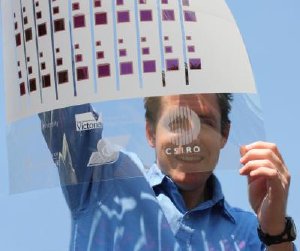Oct 1 2009
Flexible plastic solar cells that can be printed like money, carbon fibres so thin they can be spun into yarns and a raft of new biomedical products to combating illness and injury are just some of the research breakthroughs being developed by the new CSIRO National Research Flagship for Future Manufacturing launched today.
 Future Manufacturing Flagship's Dr Scott Watkins holds a sample sheet of flexible solar cells. Flexible plastic solar cells are much cheaper and more efficient to produce, and have the potential to replace silicon in the next generation of solar collectors. Credit: CSIRO
Future Manufacturing Flagship's Dr Scott Watkins holds a sample sheet of flexible solar cells. Flexible plastic solar cells are much cheaper and more efficient to produce, and have the potential to replace silicon in the next generation of solar collectors. Credit: CSIRO
The Flagship - a $36.2 million research program designed to boost Australia's manufacturing capabilities - was launched in Melbourne by Innovation Minister, Senator Kim Carr.
"Australia's innovative and highly skilled manufacturing industry is one of the greatest hopes for our future prosperity and this flagship is an important addition to its arsenal," Senator Carr said.
"Manufacturing not only provides quality jobs, it drives innovation through mobilising new skills and creating new capabilities.
"Countries that don't have manufacturing industries are building them fast and those that have let their industries go are racing to get them back.
"Australia's manufacturing employs around one million Australians, generates 10 percent of GDP and exports over $94 billion a year.
"Australian manufacturers are under increasing pressure from global competition, the rise of low-cost, low-wage manufacturing economies, and the changes that will need to be made to reduce emissions and become more sustainable.
"The future of our manufacturing industry is tied to its willingness and capacity to continue to innovate. It needs to focus on high technology, high-skill, and high-wage manufacturing where its strengths lie. This Flagship will help hone that focus."
CSIRO Deputy Chief Executive, Dr Alastair Robertson, said CSIRO's advances in the commercial development of flexible, large area, cost-effective, reel-to-reel printable plastic solar cells, supports this approach.
"Developed with our partners in the Victorian Organic Solar Cell Consortium, flexible plastic solar cells will be much cheaper and more efficient to produce, and have the potential to replace silicon in the next generation of solar collectors," Dr Robertson said.
"This is the kind of transformational, environmentally responsible technology the new Flagship has been established to create to support sustainable manufacturing into the future."
The Future Manufacturing National Research Flagship was launched at the Flagship's recently refurbished, state-of-the-art Flexible Electronics research facility at CSIRO's Clayton laboratories.
Flagship Director, Clive Davenport, said innovation is the key to positioning Australian manufacturing to meet the challenges of the future.
"Taking a holistic approach, encompassing innovation together with market integration, the Flagship will streamline the uptake of new technologies for Australian industry, which will be crucial to improving the future competitiveness of our manufacturing sector as well as generating new employment opportunities," Mr Davenport said.
"In partnership with industry we will focus on emerging manufacturing opportunities in flexible electronics, cleantech manufacturing, biomedical manufacturing and nanosafety, helping the Australian manufacturing sector address major national challenges in energy, health, climate and waste."
CSIRO initiated the National Research Flagships to provide science-based solutions in response to Australia's major research challenges and opportunities.
The 10 Flagships form multidisciplinary teams with industry and the research community to deliver impact and benefits for Australia.